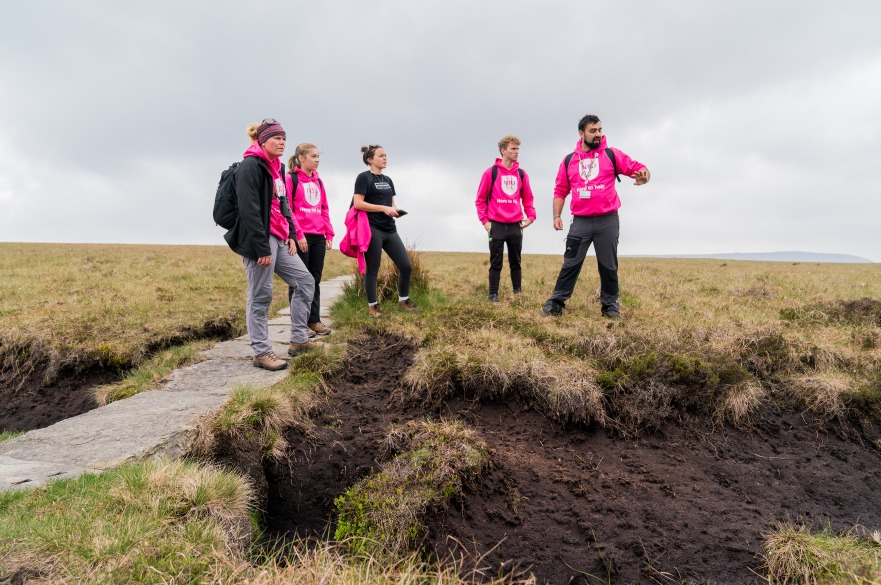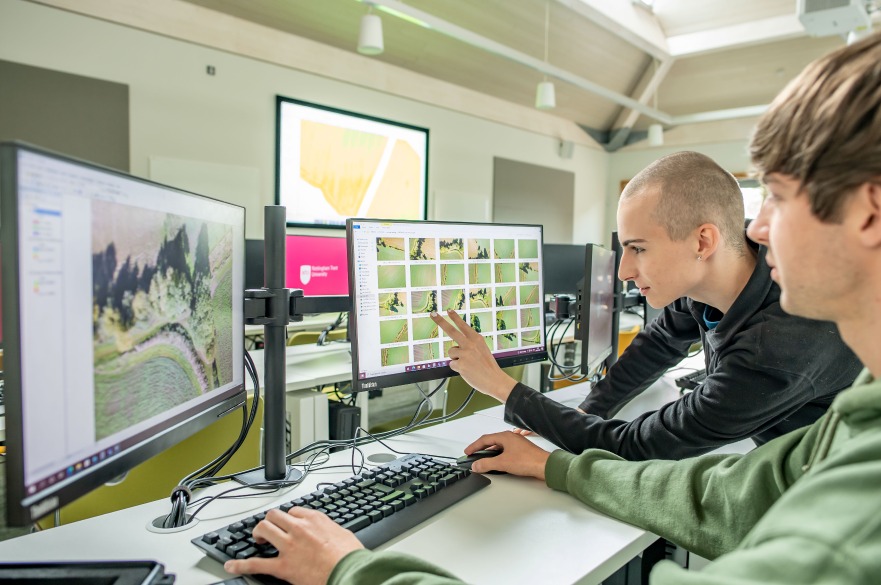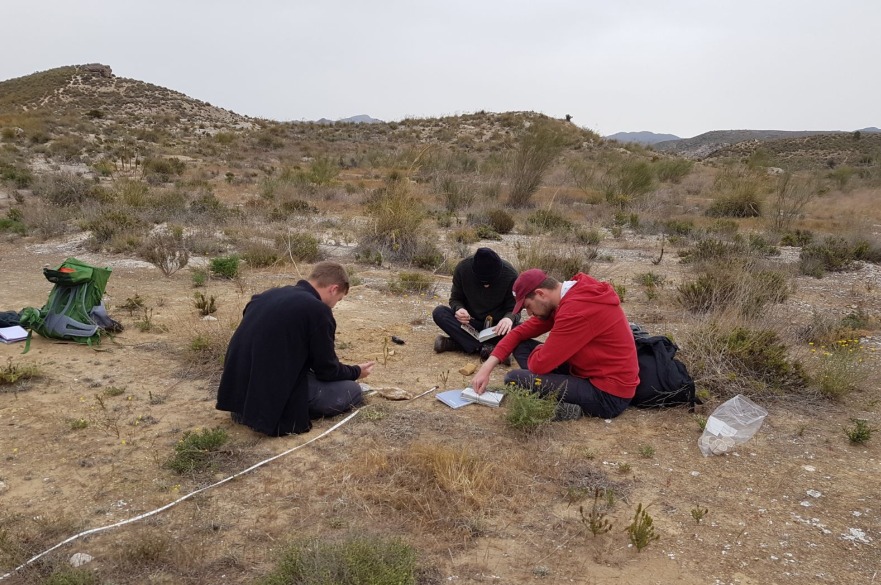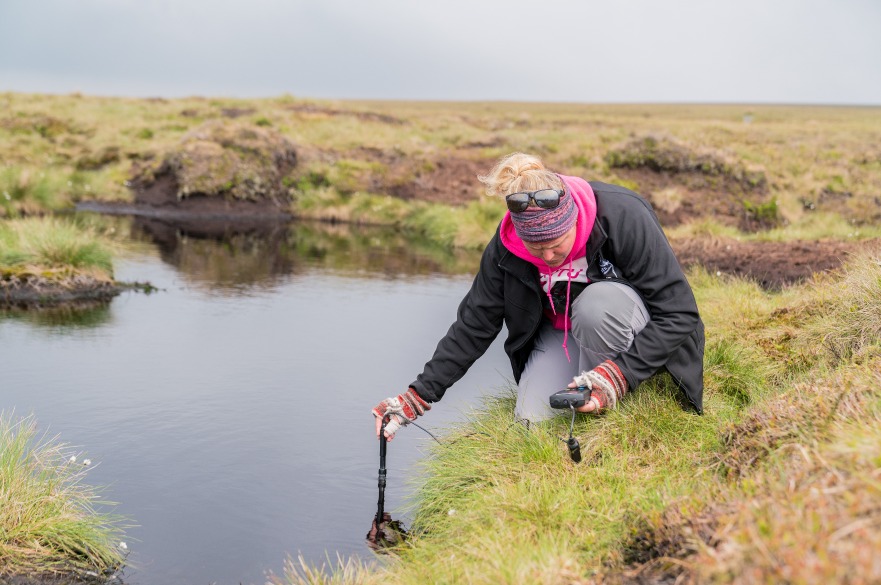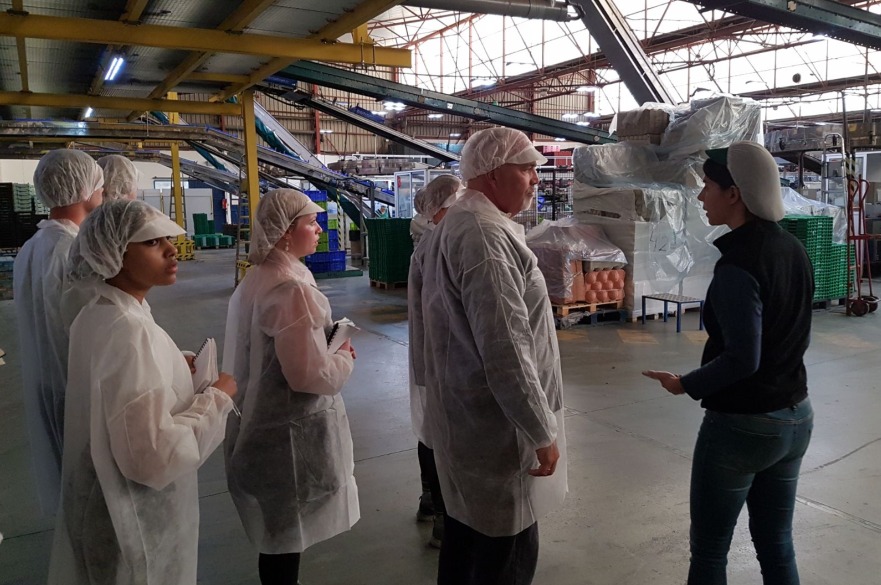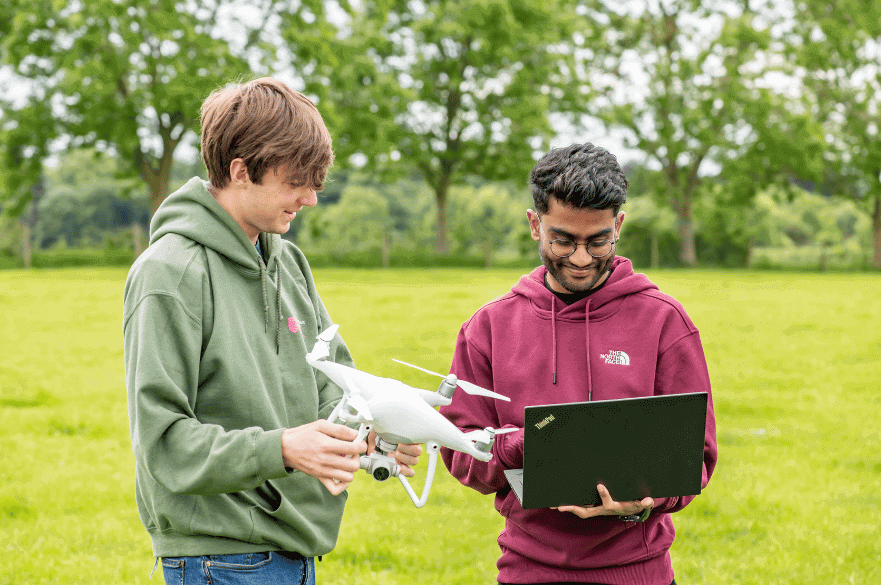This course is in Clearing
Offers from 80 tariff points
About this course
This multidisciplinary course includes the scientific study of the physical, chemical and biological processes operating on and within the Earth. It is fully accredited by the Institution of Environmental Sciences. You will explore environmental issues including natural resources, waste management, conservation and sustainability. Other areas of focus include climate change, renewable energies, environmental hazard management, and law and policy.
You'll be based at our Brackenhurst Campus – the perfect place to put theory into practice. From geographical information system (GIS) mapping and renewable energy solutions to conservation methods and weather monitoring, there's a huge range of professional tools, technology and facilities on your doorstep.
We also offer BSc (Hons) Environmental Science (with foundation year). Our integrated foundation degrees offer a unique gateway to our BSc courses for those who currently don't meet the degree-level entry criteria.
What you’ll study
This multidisciplinary course includes the scientific study of the physical, chemical and biological processes operating on and within the Earth. You’ll develop awareness and understanding of global and local earth systems.
Principles of Environmental Science (20 credits)
Gain an introduction to key laboratory and field techniques associated with environmental scientific procedures and research.
Principles of Ecology (20 credits)
Study the interaction of biotic (living) and abiotic (non-living) factors in relation to the distribution of populations and communities within ecosystems.
Biodiversity Conservation (20 credits)
Explore the biological diversity on Earth, focusing on the abundance and distribution of species. Investigate the theories of evolution, causes of mass extinctions, and conservation of species.
Global Environmental Issues (20 credits)
Study contemporary global environmental issues and their underlying causes, including how humans impact the environment and how the natural environment impacts human society.
Geodiversity (20 credits)
Learn about the Earth’s surface systems, processes and geology and develop your understanding of how the physical landscape is shaped.
Weather and Climate (20 credits)
Explore the Earth's climate system, weather patterns and the ways in which these are being altered by human activity to cause the global climate emergency.
Introduction to Research (20 credits)
Explore the principles of research methods, focusing on data collection, analysis, and interpretation. You'll look at experimental design, literature evaluation and hypothesis testing, preparing you for undertaking independent research as part of your final year dissertation.
Law and Policy (20 credits)
Investigate the development, implementation and impact of environmental policies and laws. Explore the important theme of protecting the environment via environmental politics and policies, and the ever-increasing issue of securing sustainability.
Environmental Monitoring and Geographical Information Systems (GIS) (20 credits)
Study the mapping and analytical techniques used in GIS. Explore the applications of technology across a wide range of topic areas.
Technical Skills (20 credits)
Gain a grounding in the principles, methods and applications of modern analytical laboratory and field techniques. This module currently includes a residential field trip. Previously this has taken place in Spain.
Sustainability (20 credits)
Appraise the contrasting theories, explanations of, and approaches to sustainability. Review the barriers between the theory and the practice of sustainable development.
Global Climate Emergency (20 credits)
Study the science of climate change, consider the ethical conflict, analyse political arguments, and apply reasoning to the resolution of this pressing environmental problem.
Placement year for students on the four-year course.
Dissertation (40 credits)
Undertake independent research, under supervision. Focus on your own area of interest within environmental science.
Pollution and Remediation (20 credits)
Learn about the latest developments and applications in geochemistry within the secondary environment, including its effects on humans and ecosystems. You'll study contamination issues within different environments, waste disposal and the implications for environmental management and remediation.
Energy for a Low Carbon Future (20 credits)
Investigate how to harness and distribute safe, clean energy from sources that do not deplete with use. Consider the depletion of fossil fuels and the increasing demand for energy and evaluate the choices available for the future.
Natural Resource Management (20 credits)
Explore the principles underlying the exploitation of natural resources, and cultivate a critical awareness of the social, economic and political importance of natural resource management. You will also evaluate the complex nature of managing natural resources.
Optional modules (choose one of the following):
Applications of Remote Sensing (20 credits)
This module will build on your knowledge of managing geographical information learnt in your first and second year. You’ll learn how to process, analyse and interpret information from a range of existing remote sensing techniques. You'll also obtain information for mapping and spatial analysis using data from both historical and the very latest high-resolution sensors.
Marine and Freshwater Ecology (20 credits)
You will be introduced to the structure and function of different marine and freshwater habitats, particularly the organisms that inhabit them, and their ecological interactions.
Introduction to Ecological Consultancy (20 credits)
Gain the knowledge and skills required to secure a job in consultancy by looking at Ecological Impact Assessments, including the effects of new and existing developments on species and habitats. You will explore mitigation measures to reduce significant harm, as well as the importance of effective communication with stakeholders.
We regularly review and update our course content based on student and employer feedback, ensuring that all of our courses remain current and relevant. This may result in changes to module content or module availability in future years.
Don’t just take our word for it, hear from our students themselves
Student Work
Video Gallery
How you're taught
You will be taught through a variety of methods including group seminars, lectures, practical sessions and fieldwork. The course currently includes a residential field trip in year two, previously this has been to Spain.
You will be assessed by a mixture of reports, reviews, portfolios of practical work, group and individual presentations and a field notebook.
A placement year may be taken between year 2 and year 3 of study.
Please note that field trip locations may vary and are subject to availability and change.
Careers and employability
Your future career
As one of our graduates, you will possess a wide range of academic and transferable skills, including research methodology, problem-solving and attention to detail, in addition to the specific knowledge and skills relevant to an Environmental Science degree.
The skills and knowledge acquired will equip you to pursue a career within organisations concerned with sustainable energy use and generation, the protection of natural resources, and environmental conservation.
92% of our BSc (Hons) Environmental Science graduates are in work or further study within 15 months of finishing their degrees
(of those available for work or study, latest Graduate Outcomes Survey 2021/22).
Our graduates have gone on to work for many different employers such as:
- Department for Environment Food and Rural Affairs (DEFRA)
- Environment Agency
- local government
- environmental consultancies
- conservation agencies
- private companies.
You could also progress on to postgraduate study.
Placement opportunities
You can choose to take an optional placement year in industry at the end of your second year of study. This work experience will enable you to develop your skills and put your knowledge into practice in a working environment. This experience is highly valued by future employers.
Previous students have undertaken placements in organisations such as:
- Environment Agency
- Department for Environment Food and Rural Affairs (DEFRA)
- Severn Trent Water
- British Geological Survey
- Wildlife Trusts.
NTU Enterprise
You'll also have the opportunity to turn your ideas into a viable business with help from NTU Enterprise, NTU's purpose-built Centre for Entrepreneurship and Enterprise, a support centre to help students create, develop and grow their own businesses.
Campus and facilities
As a dedicated home for our animal, rural and environmental science courses, the Brackenhurst Campus has a character all of its own. From the population of almost 2,000 students and staff to the animals themselves — cats and cattle, sheep and horses — it’s all about community. Relax with a coffee in the Orangery; kick back with your coursemates in the Brack Bar; enjoy the peace and quiet of our Victorian walled garden or Eco-Library; grab a pal and wander through 500 acres of stunning countryside.
The rural campus, which acts as an outdoor classroom, is the perfect place to put theory into practice. From geographical information system (GIS) mapping and renewable energy solutions, to flood prevention and weather monitoring, there are a huge range of professional tools, technology and facilities on your doorstep.
Our Brackenhurst Campus sits on the doorstep of Southwell: a picture-perfect market town filled with rustic pubs, cosy cafés, and boutique shops. A little further afield, and served by reliable buses that run late into the night, you’ve got Nottingham — one of Britain’s top 10 student cities, and one of Europe’s top 25. It’s stuffed with history, culture, and well-kept secrets to discover at your leisure: enjoy lush green spaces, galleries, hidden cinemas and vintage shopping by day, and an acclaimed food, drink and social scene by night.
Entry requirements
This course is in Clearing
Looking for a place in Clearing? We are accepting application and would love to hear from you!
UK students
This course is in Clearing
Looking for a place in Clearing? We are accepting applications and would love to hear from you!
Clearing requirements
From 80 UCAS tariff points from up to 4 qualifications.
To discuss our entry requirements and see what we can offer you, call us now on +44 (0)115 848 6000. Alternatively, if you already have your qualifications, apply online via our Clearing Application form.
Preparing for results day? Beat the queue and sign up for NTU Priority for up-to-date information about all things Clearing. You’ll get an offer ahead of Clearing, subject to you achieving the required grades on results day.
Additional requirements
For this course we require an A-level, or equivalent, in a Science subject.
We accept the following Science subjects: Biology, Chemistry, Geography, Environmental Studies, Human Biology and Physics. We also consider science modules as part of BTECs and other qualifications.
To find out what qualifications have tariff points, please use our tariff calculator.
Additional requirements for UK students
There are no additional requirements for this course.
Contextual offers
If you don’t quite meet our entry requirements, we might be able to make you a lower offer based on a range of factors, including your background (such as where you live and the school or college you attended), your experiences and your individual circumstances (you may have been in care, for example). This is called a contextual offer, and we get data from UCAS to help make these decisions. We do this because we believe everyone with the potential to succeed at NTU should have the opportunity to do so, no matter what barriers you may face.
Meeting our entry requirements
Hundreds of qualifications in the UK have UCAS Tariff points attached to specific grades, including A-levels, BTECs, T Levels and many more. You can use your grades and points from up to four different qualifications to meet our criteria. Enter your predicted or achieved grades into our Tariff calculator to find out how many points your qualifications are worth.
Other qualifications and experience
NTU welcomes applications from students with non-standard qualifications and learning backgrounds, either for year one entry or for advanced standing beyond the start of a course into year 2 or beyond.
We consider study and/or credit achieved from a similar course at another institution (otherwise known as credit transfer), vocational and professional qualifications, and broader work or life experience.
Our Recognition of Prior Learning and Credit Transfer Policy outlines the process and options available for this route. If you wish to apply via Recognition of Prior Learning, please contact the central Admissions and Enquiries Team who will be able to support you through the process.
Getting in touch
If you need more help or information, get in touch through our enquiry form.
International students
This course is in Clearing
Looking for a place in Clearing? We are accepting applications and would love to hear from you!
Clearing requirements
From 80 UCAS tariff points from up to 4 qualifications.
To discuss our entry requirements and see what we can offer you, call us now on +44 (0)115 848 6000. Alternatively, if you already have your qualifications, apply online via our Clearing Application form.
Preparing for results day? Beat the queue and sign up for NTU Priority for up-to-date information about all things Clearing. You’ll get an offer ahead of Clearing, subject to you achieving the required grades on results day.
Additional requirements
For this course we require an A-level, or equivalent, in a Science subject.
We accept the following Science subjects: Biology, Chemistry, Geography, Environmental Studies, Human Biology and Physics. We also consider science modules as part of BTECs and other qualifications.
Additional requirements for international students
If you need help achieving the academic entry requirements, we offer a Foundation preparation course for this degree. The course is offered through our partner Nottingham Trent International College (NTIC) based on our City campus.
English language requirements
View our English language requirements for all courses, including alternative English language tests and country qualifications accepted by the University.
If you need help achieving the language requirements, we offer a Pre-Sessional English for Academic Purposes course on our City campus which is an intensive preparation course for academic study at NTU.
Other qualifications and experience
If you have the right level of qualifications, you may be able to start your Bachelors degree at NTU in year 2 or year 3. This is called ‘advanced standing’ entry and is decided on a case-by case basis after our assessment of your qualifications and experience.
You can view our Recognition of Prior Learning and Credit Transfer Policy which outlines the process and options available, such as recognising experiential learning and credit transfer.
Sign up for emails
Sign up to receive regular emails from the International Office. You'll hear about our news, scholarships and any upcoming events in your country with our expert regional teams.
Getting in touch
If you need advice about studying at NTU as an international student or how to apply, our international webpages are a great place to start. If you have any questions about your study options, your international qualifications, experience, grades or other results, please get in touch through our enquiry form. Our international teams are highly experienced in answering queries from students all over the world.
Policies
We strive to make our admissions procedures as fair and clear as possible. To find out more about how we make offers, visit our admissions policies page.
